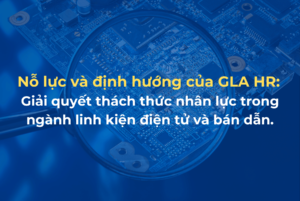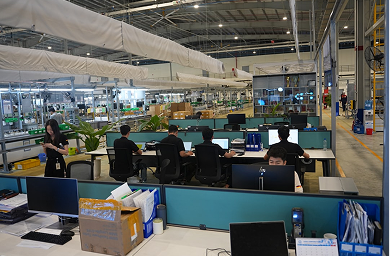1. The Context of a "Talent Shortage" in the Electronic Components and Semiconductor Industry
The electronic components and semiconductor industry is booming in Vietnam, especially with significant investments from major FDI corporations such as Samsung, Intel, Foxconn, Pegatron, and Wistron. This rapid growth has led to a surge in workforce demand, but the current talent supply has yet to catch up. Companies are facing a severe “talent shortage,” particularly in roles requiring high technical expertise, strong foreign language skills, and the ability to work in international environments. Some of the most pressing issues currently being raised include:
![]()
- Shortage of High-Quality Workforce: The current pool of skilled engineers is falling short of meeting the growing demands for production expansion. According to GLA HR’s statistics, the number of highly skilled engineers in the industry in Vietnam stands at only 25 to 40 engineers per 10,000 people, which is significantly lower compared to developed countries such as South Korea (90 engineers per 10,000 people) and China (60 engineers per 10,000 people). This shortage is becoming increasingly critical as FDI capital flows rapidly into Vietnam, especially from major corporations like Amkor and Nvidia, creating a demand for thousands of engineers and technical specialists. However, the current labor force has not kept up with the industry's pace of development, posing major challenges for businesses in attracting and training qualified talent.
- The Gap Between Education and Industry Practice: University training programs in Vietnam have yet to align with the practical requirements of businesses. Each year, the country produces around 1,000,000 new graduates, but only 29% of them pursue STEM fields (science, technology, engineering, mathematics), while the majority opt for economics, finance, and other social sciences. This percentage is relatively low compared to neighboring countries such as Malaysia (50%) and South Korea (39%). As a result, the gap between labor supply and demand in the manufacturing sector continues to widen. Curricula still focus heavily on theory, while practical skills such as machine operation, automation programming, and production process management are not sufficiently emphasized in teaching. Moreover, facilities at many universities and colleges do not meet industrial standards, with a serious lack of machinery and hands-on training equipment. This leads to a situation where graduates still need to be retrained from scratch when they join the workforce
- In addition, several critical academic disciplines that directly support electronic component manufacturing have not yet been systematically integrated into university curricula. Majors such as materials engineering, AI in automation, semiconductor engineering, and optoelectronics are still relatively new and not widely offered. This poses a significant challenge for businesses in finding talent with deep expertise in advanced manufacturing, especially in the context of rapid technological evolution.
In response to this reality, GLA HR has shaped its development strategy around three main pillars: Recruiting high-quality talent Training personnel to international standards Exporting domestic labor This strategy not only enables GLA HR to deliver a unique value proposition, but also plays a meaningful role in enhancing the quality of Vietnam’s workforce in the electronic components and semiconductor manufacturing sector.
2. GLA HR's Efforts in Providing High-Quality Talent
2.1 Recruitment of High-Quality Workforce – Meeting the Needs of FDI Enterprises
GLA HR particularly focuses on engineering and managerial positions—key personnel who play a crucial role in operating and optimizing the production processes of businesses.
With an extensive recruitment network, GLA HR is working closely with major technology corporations such as Pegatron, Wistron, LCFC, HonYaoFu, and Foxconn—companies with stringent requirements for highly skilled technical talent. The positions most commonly “headhunted” by these enterprises include:
- SMT Engineer (Surface Mount Technology Engineer) – Responsible for overseeing the entire process of soldering electronic components onto printed circuit boards (PCBs), ensuring precision, soldering quality, and optimizing the efficiency of SMT production lines. This is a critical role that helps companies minimize production errors and enhance the performance of automated manufacturing lines.
- QA/QC Engineer (Quality Assurance/Quality Control Engineer) – Responsible for controlling product quality and monitoring the production process to promptly detect and resolve defects. QA/QC engineers play a vital role in ensuring that products meet international standards, minimizing defect rates, and enhancing product reliability before shipment
- Equipment Engineer (ME – Mechanical Engineer) – Specializes in maintaining, optimizing, and upgrading machinery and production equipment in the factory. Equipment engineers ensure smooth operation of production lines, minimize machinery downtime, and help businesses maintain high productivity while reducing repair costs
- Process Engineer – Responsible for establishing, optimizing, and improving production processes to enhance efficiency, reduce waste, and ensure product consistency. This role is essential for applying Lean Manufacturing and Continuous Improvement (Kaizen) practices in real-world production environments
- Production Manager – Responsible for overseeing the entire production line, ensuring labor productivity, efficient workforce allocation, and product quality control. The Production Manager plays a central role in driving operational efficiency, optimizing production costs, and ensuring on-time delivery
The engineers and managers selected by GLA HR not only possess a solid technical foundation, but also have the ability to communicate in Chinese and English, enabling them to work directly with foreign experts and understand technical documentation related to processes, technologies, and machinery imported from abroad.
2.3 Training Personnel to International Standards – Addressing Retraining Needs and Reducing Production Errors
One of the biggest challenges faced by electronic component manufacturers is that newly recruited engineers often do not immediately meet job requirements, leading to extensive retraining, increased time consumption, and higher costs. According to data from major tech corporations, an average of 20–30% of newly hired engineers require 3 to 6 months of retraining before they are able to work independently.
To address this issue, GLA HR has developed specialized training programs tailored for engineers and production management personnel, enabling them to adapt quickly and effectively to their roles upon recruitment. The training programs include:
- Technical Skills Training: GLA HR collaborates with vocational training centers to provide hands-on internships for newly graduated engineers and partners with universities to offer internship opportunities for students before they enter the workforce full-time. In addition, GLA HR implements international-standard training programs, led by industry experts from countries with well-established semiconductor sectors such as China and Taiwan, ensuring that trainees gain both theoretical understanding and practical, globally relevant expertise.
- Management Skills Training: Equips personnel with knowledge in production management, operational optimization, productivity control, and team leadership, empowering them to grow into higher-level managerial roles within the organization.
- Language Training: Supports engineers in improving their Chinese and English communication skills, enabling them to work directly with foreign experts without the need for interpreters
Thanks to its comprehensive training programs, GLA HR ensures that the talent it provides can seamlessly integrate into the workplace and perform effectively from day one. This significantly reduces retraining time and minimizes production errors during the initial phase of employment, giving businesses greater confidence in workforce readiness.
2.4 Exporting Domestic Talent – Developing a Skilled Workforce to Return to Vietnam
GLA HR not only focuses on domestic talent but also implements a strategic approach to exporting high-potential local labor, providing engineers and production managers with opportunities to work in countries with advanced electronics industries, such as Taiwan, China, Japan, and South Korea.
Thanks to its international partnership network, GLA HR is able to connect with overseas Vietnamese students and professionals who are currently living and working abroad. These individuals possess strong language skills and a deep understanding of the host country’s culture. Upon returning to Vietnam, they become a strategic talent pool capable of taking on key positions at FDI enterprises and major tech corporations. This group is expected to become a fresh driving force in Vietnam’s talent supply—especially as the competition for high-level specialists intensifies in the near future.
3. GLA HR’s Development Orientation – Building a High-Quality Ecosystem in the Electronic Components and Semiconductor Industry

With a strategy built on three core pillars, GLA HR is not just a recruitment agency but a comprehensive human resource ecosystem, creating a strong connection between businesses and highly skilled talent.
In the long term, GLA HR is committed to pioneering the application of ESG standards in recruitment, ensuring fair hiring practices and contributing to an improved quality of life in society—aligned with Goal 8 of the ESG framework issued by the United Nations.
GLA HR is steadily establishing itself as a pioneering force in human resources for the electronic components and semiconductor industry. Through its effective recruitment strategies, specialized training programs, and comprehensive support for businesses, GLA HR not only addresses the workforce shortage but also plays a key role in enhancing the quality of Vietnam’s talent pool.
If your business is seeking an optimal human resource solution in the electronics and semiconductor industry, contact GLA HR today for expert consultation and strategic partnership!
GLA HR – Specialized in Recruitment for the Electronic Components and Semiconductor Industry


